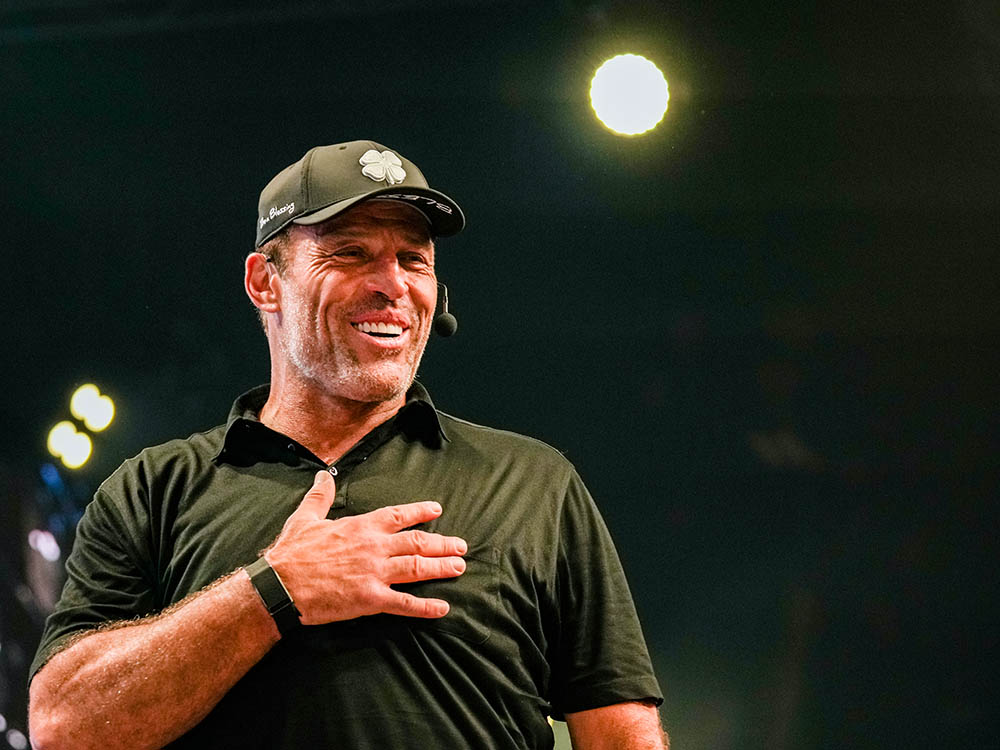Meeting life’s challenges head-on can be an uphill struggle if you feel sludgy, worn down, and low on resources. Knowing how to get more energy isn’t just about taking control of your day. You need energy to stand tall for those around you and master your responsibilities.
Low energy sometimes stems from health problems that need medical attention, such as hormone imbalances, nutritional deficiencies, and mental illness. However, anyone can implement a handful of changes to live an energized and empowered lifestyle.
We rounded up 12 powerful, science-backed sources of daily energy you can try right now.

Based on research in the bestselling book Life Force by Tony Robbins, improve your energy and focus with the premium-grade formula of Peak Rise™. Combines 14 high-dosage ingredients including 7 patented, clinically tested compounds like TeaCrine®, Dynamine™, Cognizin®, and Cereboost®.
Lifestyle Changes
Lasting energy boosts can start with minor changes to your habits. Moving more, smoking and drinking less, and energy-minded eating (including intermittent fasting) can all top up your fuel tank.
A robust sleep schedule is also fundamental to having more energy. For those deficient in certain vitamins, taking a supplement may help you feel more energized all day.

1. Exercise
Moving more is a great way to get more energy. Exercise helps oxygen and nutrients reach the tissues in your body, strengthens your muscles, and improves how your heart and lungs work. The more efficient these are, the more energy you’ll have to help you through the day.
Exercise also aids the production of mitochondria inside your cells. Mitochondria turn blood sugars into fuel, serving as an additional energy source for your body.
In a 2019 review on people with chronic fatigue, swimming, dancing, cycling, and walking reduced symptoms and provided more energy.
2. Drink Enough Water
Getting enough water can help you have more energy throughout the day.
Your energy levels may start to flag if you start to become dehydrated. One placebo-controlled study on women found that being 1.36% dehydrated negatively affected their mood, concentration, and perceived difficulty while completing tasks. A similar study on men found that 1.6% dehydration increased fatigue at rest and during exercise and affected their working memory.
So, knowing how to get more energy can be as simple as staying hydrated. But the right amount of water for you depends on:
Your gender
The climate where you live
How often you exercise
Your overall health
Whether you’re pregnant or breastfeeding
You can keep the H20 flowing with several small daily adjustments:
Add flavor with lemon or orange slices.
Take a full water bottle with you when you leave the house.
Try "habit stacking" by linking your new goal (drinking a glass of water) with parts of your routine you're already doing (like brushing your teeth).
Get water through hydrating foods like soups and watermelon.
3. Get Better Sleep
You can get more energy in the morning by tweaking your sleep schedule. People operate at a higher level when they get enough rest. Good sleep is a pillar of your alertness, mood, and cognition. Poor sleep has the opposite effect.
Getting at least seven hours of sleep every night helps you feel better and perform better, recharging your problem-solving abilities, reasoning, and intellectual capacity ahead of tackling the next day’s challenges.
Maintaining good sleep hygiene improves your quantity and quality of sleep. This means:
Having a regular bedtime
Keeping your room cool and dark
Staying away from screens at least 30 minutes before you sleep
Avoiding alcohol and caffeine too close to your bedtime
Investing in a high-quality mattress and comfortable sheets
4. Quit or Avoid Smoking
If you smoke, you’re holding your energy levels hostage. Smoking damages your health in several ways that prevent you from optimizing your day, including:
Reducing how much oxygen binds to hemoglobin in your blood. Low oxygen may increase your risk of fatigue.
Narrowing your blood vessels. This means your heart and lungs must work harder to pump blood around your body.
Denting your sleep quality. A study of over 27,000 people found that sleep disturbances were more common among smokers than those who didn’t smoke. The stimulating effects of nicotine are a likely culprit for sleep problems.
Increasing your risk of chronic disease. Smoking makes heart and lung diseases, diabetes, cancers, and stroke more likely. Living with one chronic disease raises the risk of fatigue by a factor of 1.6, according to one study of 78,363 people.
A study of 350 people found that quitting smoking for six months improved the participants’ energy levels, sleep schedule, mood, and cognitive function.
To help, you can try smoking cessation counseling, including via phone (1-800-QUIT-NOW) and text services (SmokefreeTXT) or mobile apps like quitSTART that monitor your progress with quitting. You can also try Nicotine Replacement Therapy (NRT) or medications like varenicline and bupropion that can help you manage withdrawal.
5. Try Intermittent Fasting
Aside from being a useful weight management tool for many, intermittent fasting (IF) may benefit your energy levels. IF involves eating only during specific time windows or on certain days of the week.
A review of eight studies reported that IF improved energy levels, mood, and self-confidence. While IF can temporarily cause low energy as a side effect, less than 15% of the participants in the review experienced unwanted effects.
Get started with IF with our Beginners Guide to Intermittent Fasting.
6. Limit Alcohol Intake
Cutting down on alcohol can help you get higher quality sleep and prevent you from feeling sleepy throughout your day.
That nightcap might interfere with your slumber for several reasons:
A few hours after consumption, alcohol triggers the release of epinephrine. This stress hormone can stimulate your body to wake up during the night.
By relaxing your throat muscles, alcohol may contribute to breathing difficulties that disrupt sleep, including sleep apnea.
Alcohol can stimulate more night-time bathroom visits.
If alcohol interrupts your sleep, you may feel energy-starved the next day. A single drink during the day exposes you to alcohol’s sedative effects, disrupting your energy levels and keeping you from your best.
7. Eat for Long-Term Energy
If you’re wondering how to get more energy through your diet, stick to nutrient-dense foods that release energy slowly.
These include:
Whole grains. These have low glycemic index (GI) scores, giving you a slower burn of energy than refined, processed carbs.
Proteins and fats. These delay the absorption of carbs into your blood, further reducing your risk of energy-sapping spikes and crashes.
Low-sugar foods. Added sugars in foods quickly enter the bloodstream and can lead to blood sugar spikes, followed by crashes that tank your energy. Stick to a high-fiber, low-sugar, protein-rich diet for a steadier energy supply.
Keeping your mealtimes regular may also improve your energy levels. Skipping breakfast or eating at irregular times daily can increase your fatigue risk.

8. Consider Supplements
Taking supplements could help you round out your nutrient profile and ensure your body has what it needs to keep going all day.
Deficiencies of vitamins B12, vitamin D, and iron can all contribute to an energy drain that keeps you from experiencing optimum performance. These nutrients contribute to bodily functions that are central to maintaining peak energy. Iron and B12 help you produce red blood cells that carry oxygen around the body, and vitamin D helps to support healthy bones and muscles.
If you’re concerned about how to get more energy, have a doctor check your vitamin levels and consider a high-quality multivitamin. You can also check your critical nutrient levels with the Lifeforce Diagnostic at-home blood test.
Want more tips on which vitamins to take? See 17 Energy Boosters to Level Up Your Day.
Make Life Less Stressful for Improved Energy
Stress can fuel fatigue by interfering with your sleep and making it harder for you to keep pace with changes. This difficulty is known as allostatic load.
Making your life more enjoyable and enriching provides a strong foundation for peak stamina.
9. Stay Social And Value Relationships
Investing in time with your people can have a powerful stress-reducing effect. Social support is integral to good mental health, potentially reducing stress hormone levels and allostatic load. Conversely, staying isolated can drive physical and psychological decline.
Relationships are often hard work, but you can foster them by:
Showing genuine curiosity about your friends’ and family’s lives and listening empathetically.
Saying “yes” to more social activities. However, moderation is vital. Burning the social candle at both ends may increase fatigue a few hours after socializing.
Arranging one-on-one meetups if you’re introverted or if larger social gatherings wear you out.
Staying positive and giving compliments sincerely and freely.
Taking up new hobbies and interests to meet more people.
Setting boundaries and sticking to them so you maintain high-quality relationships.

10. Practice Mindfulness Meditation
Meditation has associations with inducing sleepiness and relaxation, but this can make it an effective approach for how to get more energy naturally.
In a randomized study, mindfulness meditation was more helpful than sleep hygiene education for treating insomnia and its energy-draining side effects. By affecting several pathways for your brain’s stress response around attention and emotion, mindfulness meditation rewires your brain to cope with stressors more effectively.
Read more about meditation in our article on 5 Science-Backed Ways to Reduce Stress.
11. Laugh More and Plan Fun Distractions
Sometimes knowing how to have more energy comes down to laughter. It really can be the best medicine.
Laughter affects your body by boosting levels of the feel-good chemicals dopamine and serotonin. It also reduces levels of cortisol, the stress hormone. A small study on recent mothers who received two weeks of laughter therapy found that it reduced postpartum fatigue.
Try the following to elicit a good laugh:
Make time to watch a comedy movie or stream a stand-up set.
Visit a comedy club with friends.
Call a fun friend who makes you laugh.
Simulate laughter, even without a stimulus. Research indicates that your body can’t distinguish between the two, and it may still provide an energy boost.
12. Do Something for Someone Else
One of the best ways to get more energy can involve lending a helping hand to a friend or stranger. A 2016 study found that prosocial behavior can reduce stress, boost mood, and bolster mental health.
You can try:
Offering to help a friend with a personal problem or practical situation like moving house
Making a charitable donation
Giving some helpful or inspiring advice online
Spreading good feelings with a compliment
Looking out for small, easy ways to help people in need who could benefit from your skills
What If Lifestyle Changes Don’t Boost Your Energy?
Lifestyle changes may help. However, if a health problem is behind your fatigue, learning how to have more energy starts at the doctor’s office.
Many medical conditions can underpin fatigue, including:
Vitamin deficiencies
Depression
Anxiety
Underactive or overactive thyroid and other hormone imbalances
COVID-19
Fibromyalgia
Inflammatory bowel disease (IBD)
Heart disease
Diabetes
Sleep apnea
The side effects of medications and treatments
Your doctor can perform blood tests and evaluations to identify the root cause of your low energy. While a healthy, balanced, and enjoyable lifestyle can support your well-being, along with treatments for an underlying health condition, receiving the right care is essential.
Summary
Good sleep, regular exercise, and a nutritious diet can all support you in how to gain more energy, but they’re parts of a larger puzzle. A joyful, purposeful, compassionate life may also energize you. If you still struggle with energy issues after adjusting your lifestyle, ask a doctor for their insights and for further testing.

Based on research in the bestselling book Life Force by Tony Robbins, improve your energy and optimize your health with the Lifeforce Membership. It empowers you with everything you need to track your body, get expert guidance, and take the right steps to live at your peak.
This article was medically reviewed by:
Ryan Greene, DO, MS, Board Eligible Integrative and Preventive Medicine Specialist








